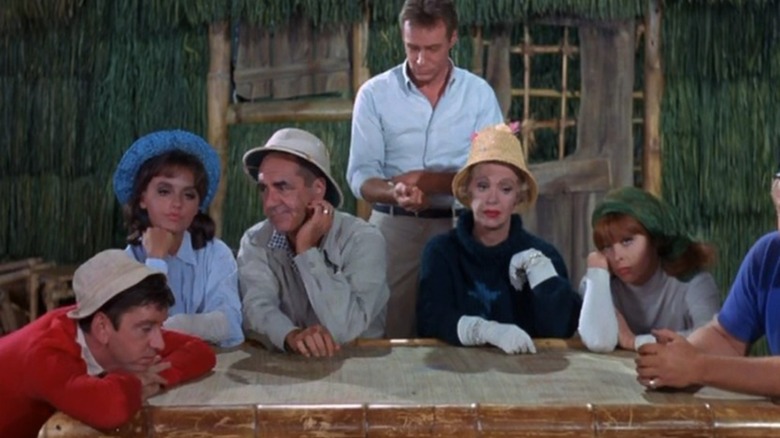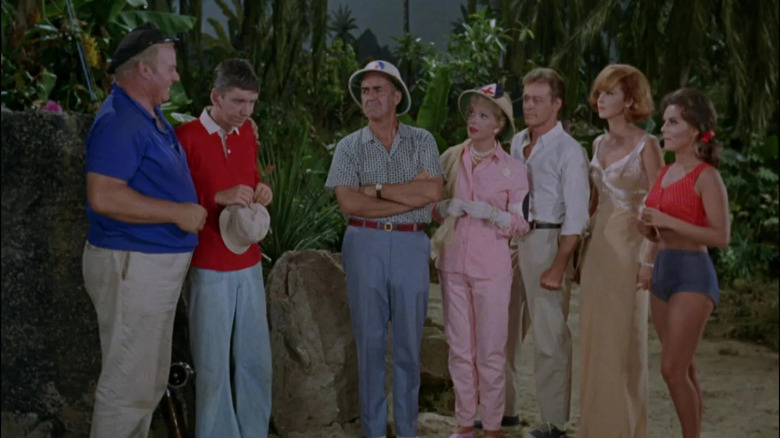Gilligan's Island Creator Sherwood Schwartz Was Almost Fired From The Series
When Sherwood Schwartz was still brainstorming ideas for "Gilligan's Island," he came up with the character dynamic before he invented the premise. More than anything, Schwartz liked the idea of seven disparate characters, hailing from all walks of life, forced to live together in an enclosed environment. Initially, he thought that a workplace would be a good location to explore that dynamic, but quickly rejected that idea, figuring that employees in an office would all have that office in common. He eventually thought that comedy could be mined from seven people stranded on a remote tropical island together, and the creative train was rolling.
Fans of "Gilligan's Island" likely know that the series needed a lot of fine-tuning, and might even know that the executives at CBS didn't like the concept. Indeed, there were stories that the head of CBS' programming, a man named Hunt Stromberg, was hoping Schwartz would mess up somehow, and that the showrunner could be fired, leaving "Gilligan's" to a more capable producer. Stromberg nearly got his wish, too, as Schwartz turned in multiple scripts past their assigned deadlines, making it seem as if the high concept sitcom would never gel.
Longtime "Gilligan's Island" director John Rich and prolific writer Sol Sacks (who also created "Bewitched") recalled all the interactions between Schwartz and the CBS fat cats in several video interviews with the Television Academy. They both recalled how much the creative team would butt heads with "the suits," and how Schwartz, throughout the development process and the shooting of the first few episodes, was poised to be placed on the chopping block.
Rich specifically noted the old showbiz wisdom about (shudder) studio notes. Specifically, when a network executive says "Hey, I've got an idea," you should instantly run in the opposite direction.
Sherwood Schwartz was hanging by a thread
Rich recalled that execs were constantly making suggestions for "Gilligan's Island," and that he had to reject their ideas. Specifically, he remembered an executive suggesting a comedic scene where a helicopter lands on the island to rescue the castaways, only to sink into quicksand. A comedic setup, perhaps, but Rich asked how they were supposed to film that. How does one extract a full-size helicopter from quicksand? The technical observation made the exec angry.
Sadly, that kind of pushback only inflamed the imagination of Hunt Stromberg, who knew that Sherwood Schwartz, according to his contract, could be fired at any time. Stromberg was made even angrier when one of the show's producers left unexpectedly, and Schwartz hired himself as the replacement. No one else minded when Schwartz made himself a producer, because, well, he was well liked by the cast and the writers. But, golly, CBS hated Schwartz's power move.
CBS was so furious, in fact, they chose a replacement for Schwartz during filming. Their choice was William Froug, who had produced "The Twilight Zone."
Saks once spoke with Froug about the "Gilligan's Island" situation, and how CBS actively arranged to fire Schwartz. By now, however, "Gilligan's Island" had been on the air for a few weeks, and it seems the numbers spoke for themselves. Saks recalled the conversation between Stromberg and Froug:
"'Look, everybody likes Sherwood. We've got to let him go.' [...] They put Bill Froug in his place because Bill had produced, and Bill told me this story: They set up a meeting, he and Sherwood, where he was going to tell him as diplomatically as possible that he was to leave the show. [Beforehand, though Stromberg said to Froug] 'Well, I told you. Tuesday, you are going to tell him [he's out.]' [Then Froug said] 'Yeah, yeah. But did you see the new ratings? "Gilligan's Island" is No. 4!' 'Cancel the meeting! Cancel the meeting!'"
The rest was history. "Gilligan's Island" was a hit, and Schwartz's job was saved. The series lasted 98 episodes, and became a permanent fixture in pop culture. Sometimes, it's okay to trust the creatives.

